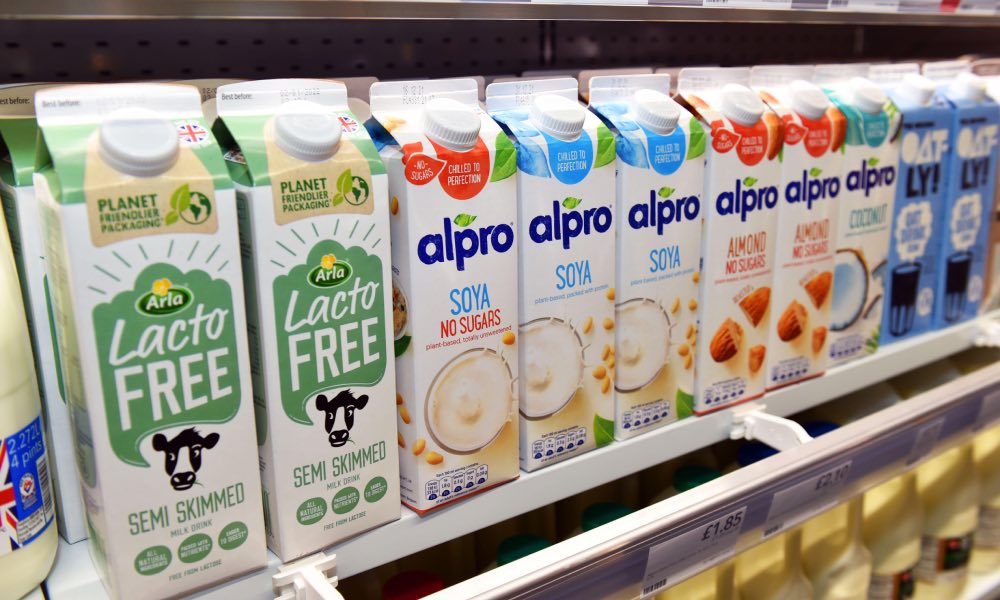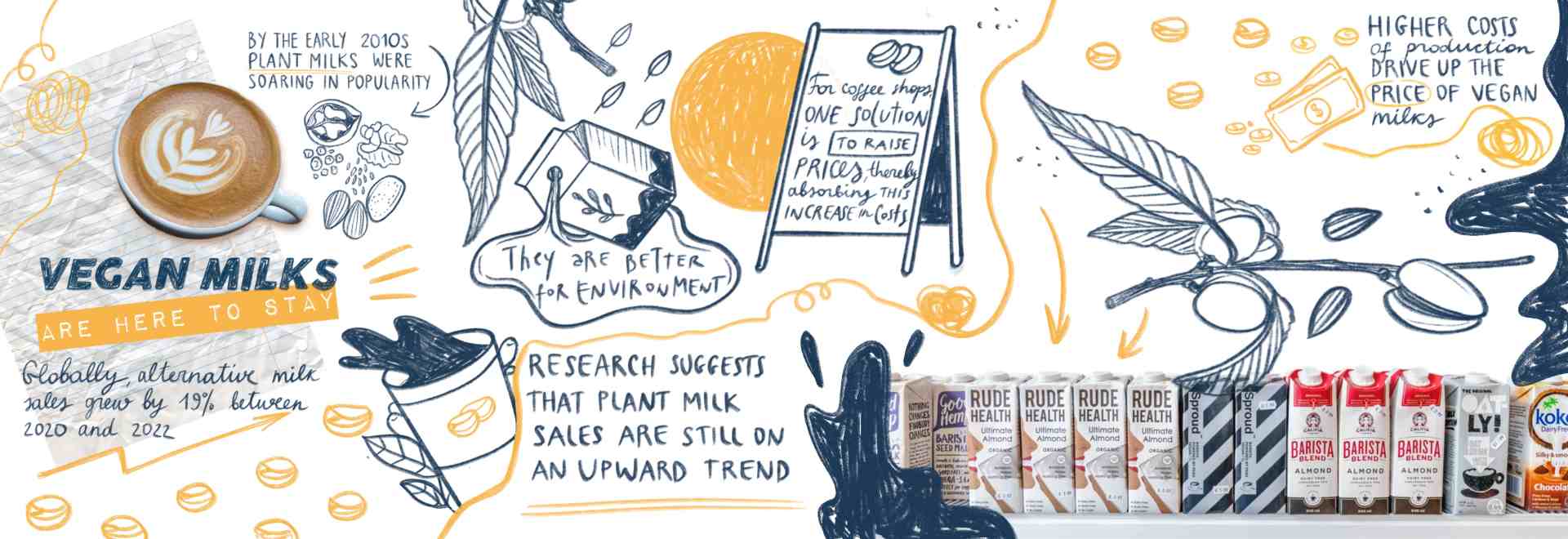Has the vegan milk coffee craze peaked?
Anay Mridul speaks to Gavin Winterwell and Dougal Gordon about the popularity of plant-based milks, and if their position in the coffee market is secure enough to withstand a cost-of-living crisis.
In spite of their presence in the coffee industry for over ten years, vegan milks are still often considered the new kid on the block. However, plant-based products have made a serious dent in the once-monopolised milk segment.
When Starbucks introduced soy milk in its stores in 2004, it did not take long for plant milks to gain real traction. By the early 2010s, they were soaring in popularity.
Ethical consumers became increasingly conscious of the problems associated with dairy farming and turned to plant-based milks on mass.
The pandemic saw a new wave of acceptance of vegan milks. Globally, alternative milk sales grew by 19% between 2020 and 2022, while conventional dairy saw a drop of 9%.
While almond milk still leads retail sales in some major markets, oat milk is now the go-to milk for coffee shops across the world.
Oat milk has seen an explosion in popularity – its prevalence in specialty coffee helping to promote it to the wider consumer market.
“It’s ridden the wave of specialty coffee,” explains Gavin Winterwell, owner of London vegan coffee shop The Fields Beneath. “It’s probably got the most neutral flavour profile and doesn’t mask the coffee’s taste. It steams really well, so you get the microfoam that a lot of other milks don’t get.”
Gavin also attributes some of oat milk’s success to Oatly. Their marketing campaigns have long since positioned oat milk as coffee’s perfect companion. While the brand has its fair share of critics, it’s clear they were trailblazers on the vegan milk scene – targeting coffee shops and using that platform to introduce oat milk to consumers.
Thanks to a press release calling out the World Barista Championship, Oatly has now also helped introduce vegan milk to the competition stage.
With oat milk pioneering the way, alternative milks have become a staple offering at coffee shops across the world. However, they do come at a higher price, and the cost-of-living crisis may have just tipped the balance for the vegan milk category.

Tough times ahead
Higher costs of production drive up the price of vegan milks and, in the current economic climate, the extra money needed to pay for a carton of oat milk may be the saving that many customers are having to make.
Plant-based milks were expensive before inflationary pressure came to a head. The raw materials used, such as oats, almonds and soybeans, require more intensive processing to turn them into milks, which comes at a higher cost. Bottling procedures and packaging materials are also expensive.
All this means that right now, vegan milk products are on average 13 to 14% more expensive than they were a year ago. And some customers – most likely those operating on flexitarian diets – have switched away.
With companies like Beyond Meat seeing revenues slump and Pret a Manger closing almost all its vegetarian stores, there could be evidence that this market segment has tough times ahead.
For coffee shops, one solution is to raise prices, thereby absorbing this increase in costs.
Gavin explains that The Fields Beneath has increased its prices by 10% in the last 12 months to accommodate higher staff wages, as well as the increased costs of coffee, chocolate, and oat milk – but sales are still very strong.
“We haven’t got a choice,” he says. “Customers can take more than we think in price increases. I might be wrong, but I’ve surprised myself over the last year with how we managed to put our prices up quite significantly, and people are still prepared to pay for that.”
Gavin believes that the coffee industry is terrified of raising its prices. However, with clear communication between baristas and customers, price increases can be managed without affecting sales, and it can relieve huge pressure on the bottom line.

Vegan milks are here to stay
Given these higher costs, many shops add a premium to their vegan milk drinks. However, as they are better for the environment and do not cause the harm that dairy farming does, customers often advocate for coffee shops to remove the surcharge.
Ozone Coffee Roasters have just done this – customers are simply able to swap dairy for a vegan milk alternative.
Ozone’s retail operations manager, Dougal Gordon, says oat milk coffee orders are as common as dairy in the brand’s four east London locations.
With oat milk sales at such a high volume, coffee shops are able to benefit from economies of scale – ordering a larger amount at discounted prices.
The Fields Beneath has oat milk delivered in pallets. “When you’re buying about 1,000 litres at a time, that works,” Gavin says. “If we’re buying 20 litres a day, that would be a really, really big problem – it would add on thousands of pounds across the year and be unworkable.”
He adds that some oat milk brands deliver their product in half pallets, so if coffee stores have the space to take that amount of milk, it’s a great way to manage prices.
However, for coffee shops without the space or sales volume to justify buying a pallet at a time, vegan milks remain a premium product.
Despite this, Gavin believes the future of plant milk in the coffee industry is bright, and that demand for these alternatives will only rise. “First and foremost, people want a milk that’s tasty and good value, and that looks after their health,” he says. “Once they become aware of the downsides of animal products, I don’t see any reason why alternative milk sales wouldn’t continue to increase.”
Indeed, research suggests that vegan milk sales are still on an upward trend. Last year, the total plant milk category grew in sales by 9% to $2.4 billion, while refrigerated oat milk sales exploded, increasing by 37% to $512 million.
And while oat milk’s neutral flavour means it remains popular with coffee, other fruits, nuts, and grains are appearing in the market and can re-energise the sector. For Gavin, as long as it’s a cost-competitive product that’s delicious in coffee, it is worth exploring.
When we look at where the industry was 10 years ago, it’s clear that plant milks have come a long way. An enormous amount of product development and marketing prowess has secured their place in coffee shops across the world. And while a cost-of-living crisis might cause customers to think more carefully about paying more for oat or almond milk, it’s clear that it will take more than that to knock plant milks off their perch.








